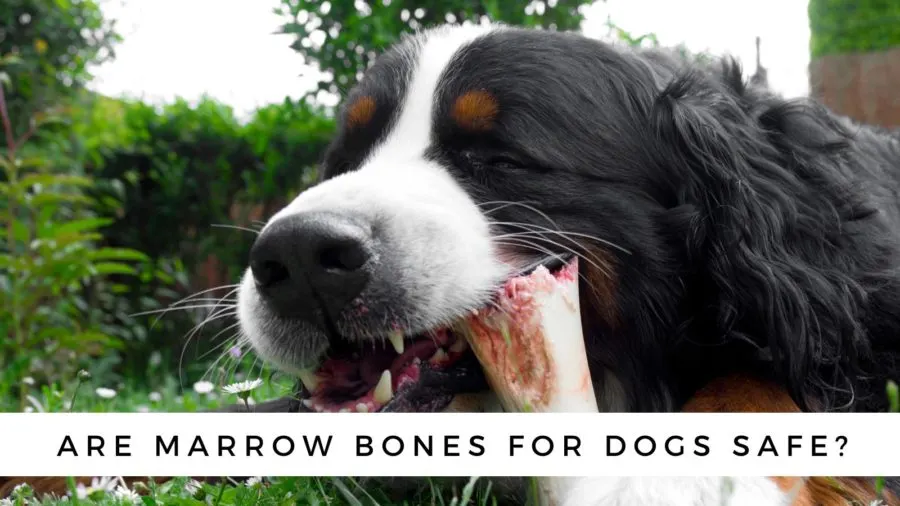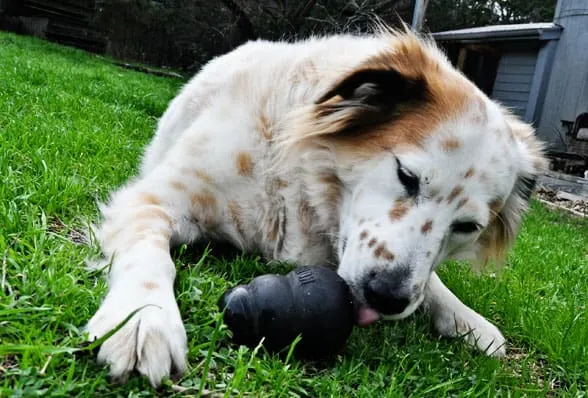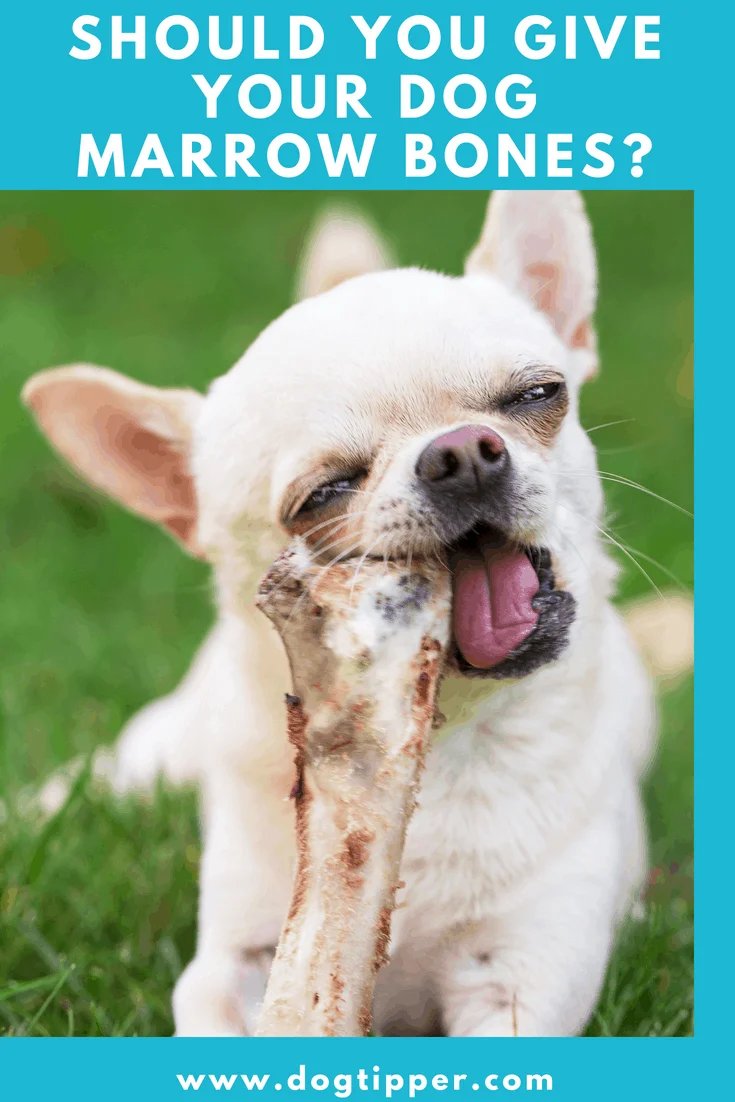Are marrow bones for dogs a safe recreational chew? Is it safe for dogs to chew marrow bones? That’s definitely a bone of contention in the dog world! We’ve got the pros and the cons below–based both on our personal experience and on veterinary advice–so that you can make the best decision for your dog.

Should Marrow Bones Be Cooked for Dogs?
First, the easy answer: you should never give your dog or puppy cooked bones. Whether you’ve barbecued them, roasted them or boiled them, a bone that has been heated has been cooked–and that means you do NOT want to give it to your dog as a chew. Save it make your dog a nice batch of bone broth, a much safer way for your dog to enjoy the nutrients still found in the cooked bone.
The cooking process dehydrates the bones, making them far more likely to splinter and break. Splintered bones can puncture an organ and lead to life-threatening complications.
Beyond that, though, things get a little stickier with both pros and cons to giving your dog marrow bones.
The Pros of Giving Your Dog Raw Bones
Ask most raw advocates and you’ll hear that raw bones—from large marrow bones to chicken wings and thighs—play an important role in their dog’s diet.
Digestible bones like bird bones (comprising up to 10% of the diet) provide the necessary calcium your dog requires. These are small, raw bones your dog chews and swallows.
Large marrow bones are a recreational favorite and are also an excellent source of vitamins and minerals.
Our dogs like nothing better than a marrow bone. We’ve seen raw bones calm Irie during times of thunderstorms and fireworks as she keeps herself busy chewing (and chewing and chewing) that bone.
Raw marrow bones not only provide your dog pleasure but also help clean his teeth.
The Cons of Giving Your Dog Raw Bones
On the flip side, raw bones can present a danger. The American Veterinary Medical Association (AVMA) warns, “Bones or bone fragments in some raw diets can result in intestinal obstruction or perforation, gastroenteritis and fractured teeth.”
Fractured Teeth from Chewing on Bones
We can testify to the fractured teeth: our Irie, a devoted marrow bone chewer, had to have three teeth extracted due to fractured teeth.
The next year, Tiki lost two teeth due to the same reason.

Today our dogs only get marrow bones as a very occasional special treat; for everyday chewing, our dogs have Icelandic+ horns (which are keratin–similar to a fingernail–not bone).
If you are going to give your dog large marrow bones, give the bones as a fresh treat but then, once your dog has chewed out the marrow and the bone begins to dry, discard the bone.
As it dries, the bone becomes more harder and more brittle, more likely both to break a tooth or to splinter into dangerous pieces.
For some dogs, the rich fat of the marrow can also cause intestinal upset. It is also high in calories.
If your dog is new to marrow bones, you may also see blood on his gums (and on the marrow bone) after chewing. Like a person new to dental flossing, chewing bones may cause bleeding at first.
Intestinal Obstruction
If a bone splinters while your dog is chewing it and your dog swallows the piece, there is a risk of intestinal obstruction. This can necessitate surgery.
Resource Guarding Caused by Bones
Tummy troubles have rarely been the case in our house, but we have seen another down side of bones: resource guarding.
When Irie and Tiki each get a marrow bone, we see them go to opposite sides of the yard (we only give the bones outdoors except during thunderstorm/firework periods when we give them in the house but with an old sheet over the bed and couch).
If you have multiple dogs and they already engage in resource guarding (Irie and Tiki happily share any other time), keep a close eye on them when they have this high value treat.
What do Veterinarians Think about the Safety of Marrow Bones?
The decision to feed bones, whether as part of a diet or as an occasional treat, is one that you will need to make after consulting with your veterinarian.

We turned to Dr. Audrey Harvey for her advice on marrow bones.
“Both the US Food and Drug Administration and veterinary dentists agree that eating bones is not good for dogs. They can fracture teeth, and cause intestinal obstructions and constipation,” she noted.
But Dr. Harvey realizes that it’s not as simple as instituting a “no bone” rule.
“Do you give him a bone to satisfy his urge to chew, or do you take the chance on him eating a tree branch which is also potentially dangerous?
“There are alternatives to bones that he may enjoy, such as nylon bones, or stuffed rubber Kongs. They are easier on their teeth but a determined chewer can still gnaw them into little pieces and swallow them. Pigs ears and cows ears are also an option.”

The bottom line?
“I think that if you’re aware of the potential risks, and the alternative is your front fence or the leg of your dining room furniture, then bones are okay. Avoid the large marrow bones because they do break teeth, and also small bones like neck bones which may be swallowed whole. Brisket bones are a good choice. Whatever your dog is chewing, make sure you don’t leave him unattended.“
There you have it!
As with many aspects of life with dogs, choosing whether to serve marrow bones or not to your dog is a matter of personal choice, depending on your dog, your dog’s chewing habits, and your schedule as to whether you’ll have time to watch your dog.
The numerous pros and cons definitely give pet parents a lot to chew on!
FAQ
Is bone marrow good for dogs?
Bone marrow contains many nutrients but it is fatty and can lead to digestive upset. If your dog has had digestive issues in the past (especially pancreatitis), tread carefully or talk with your veterinarian first about alternative chews.
How should I thaw frozen marrow bones for dogs?
Marrow bones are usually sold frozen at the grocery store and are best stored frozen. When you’re ready to give one to your dog, you can run it under cold water to take off the frost or let it defrost in your refrigerator overnight.
Can puppies have marrow bones?
Until they have their permanent teeth (about 7 months), puppies will do better to have softer chews like bully sticks (but always with your supervision). Young puppies don’t have the jaw strength to really get into bone chewing. If you do decide to give your puppy a raw marrow bone, be sure to supervise him while he chews.
Looking for recipes for your dog? Download one of our free dog treat cookbooks!
Pin it to remember Are Marrow Bones for Dogs Safe?

- Who are the Top Pet Influencers and Should Your Dog Join In the Fun? - April 10, 2024
- Should Dogs Sleep on the Bed? - April 9, 2024
- 10 Spring Cleaning Tasks for Dog Homes - April 9, 2024
